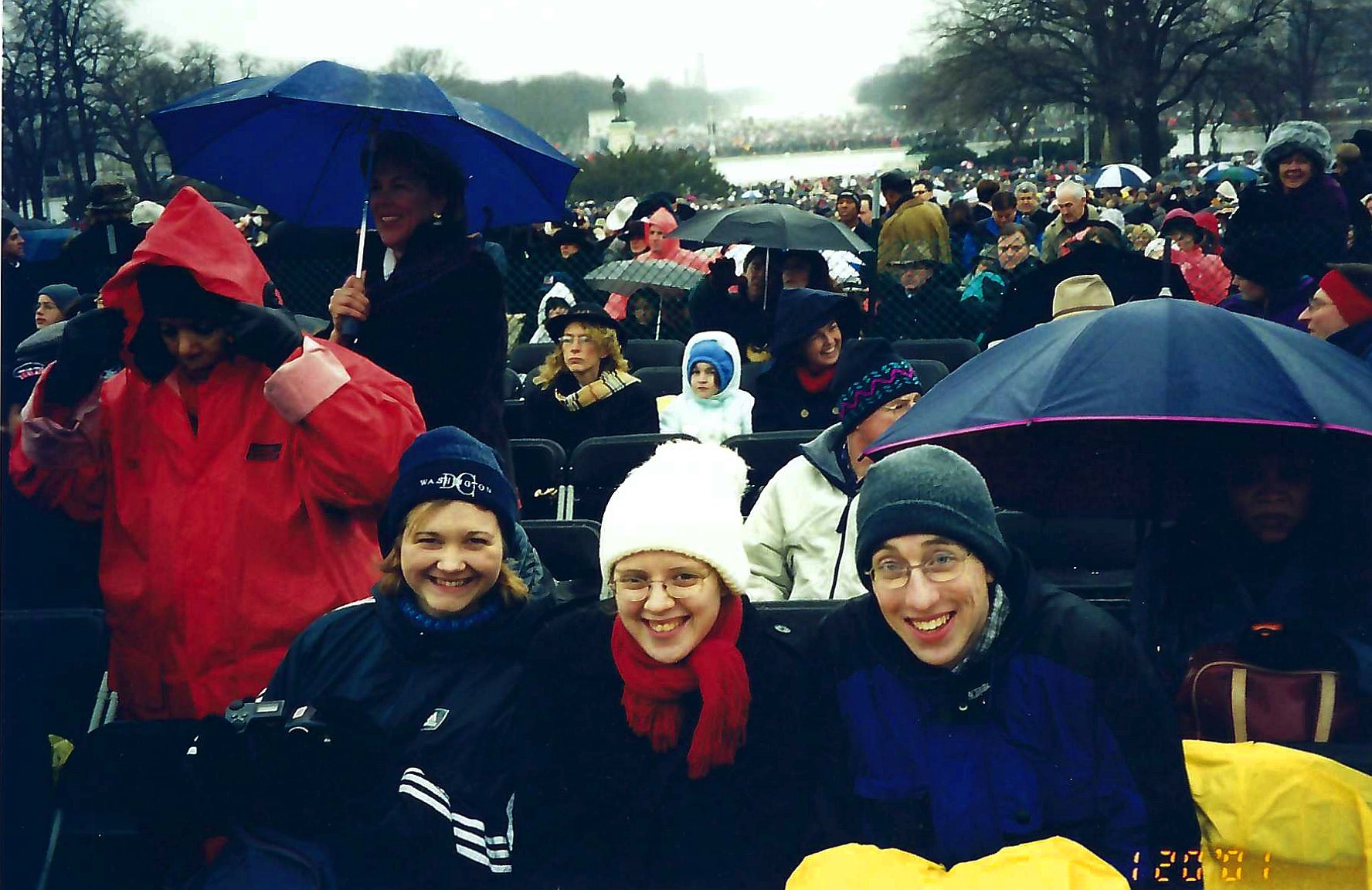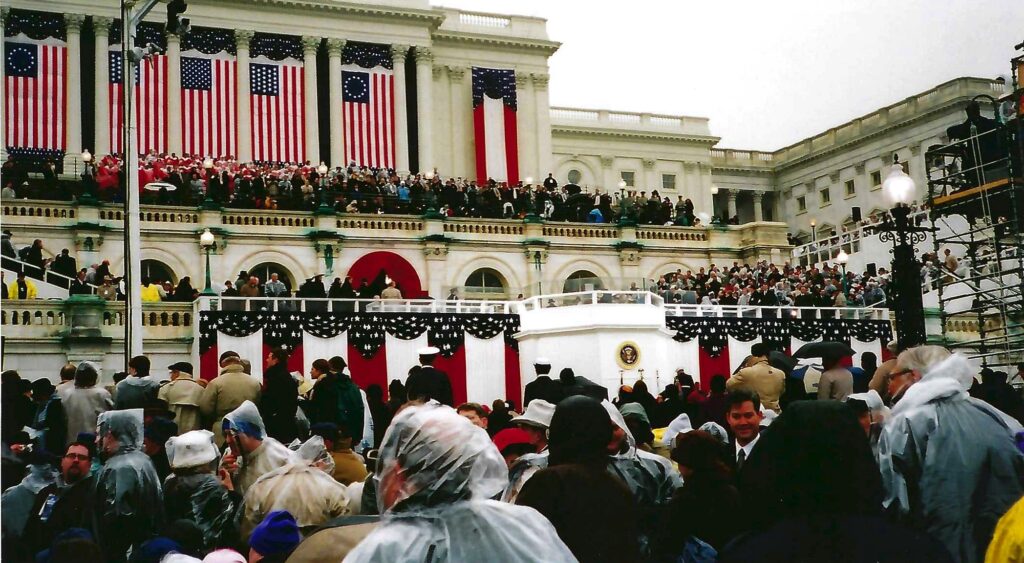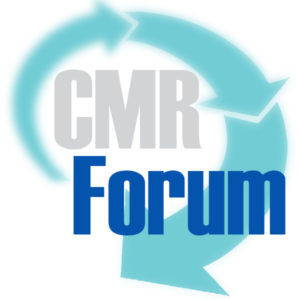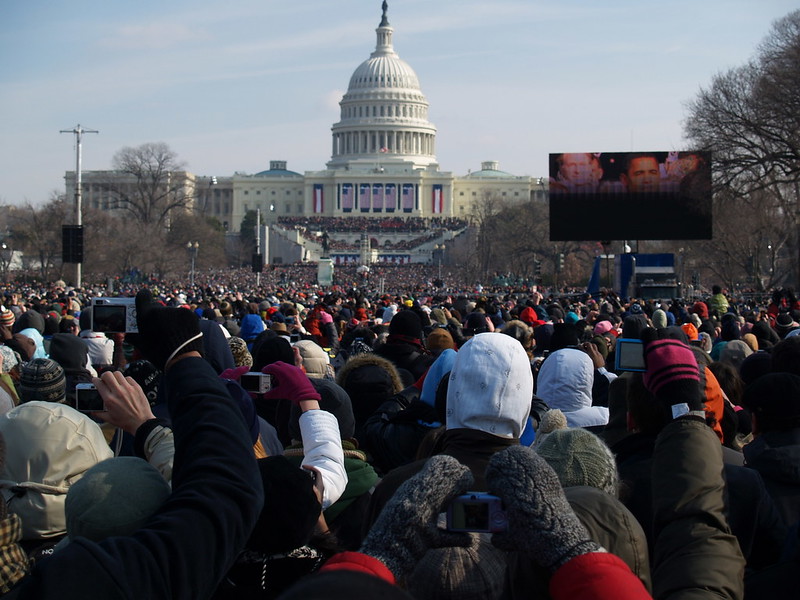
Bearing witness to democracy on the road presents challenges but pays an enormous dividend
By David Swartzlander
Past President, College Media Association
Attending my first inauguration was a dream come true.
Literally.
After I was hired in 1999 as a journalism instructor at Doane University in Crete, Neb., I was told I had a month to come up with an idea to teach a course for a two-week interval between fall and spring semesters. Students learned through mini-courses on campus or they traveled off-campus for academic reasons.
For days, I searched in vain for an idea. When my head hit the pillow one week before the proposal deadline, I still was clueless.
That’s when I dreamed I attended the 2001 presidential inauguration. And I realized that it happened every four years on Jan. 20, perfect timing for the class. I had my course.

Over my 22 years at Doane, I led dozens of students to five presidential inaugurations — from the “hanging chad” election of George W. Bush to the magically historical inauguration of Barack Obama to the “American Carnage” inauguration of Donald Trump. We traveled as one news organization, reporting and sharing stories with students and readers/listeners in Nebraska.
During those five inaugurations, we never lost luggage or a student — though one went AWOL for three hours one day, and we inadvertently left a blind student to fend on his own, briefly, at a Metro station. Your heart sinks when you hear another student yell after the Metro train doors closed: “We left the blind kid!” That “blind kid,” by the way, is now the press secretary for the U.S. Senate Judiciary Committee. Incredibly, we made it through every checkpoint along the way to be witnesses to democracy in action.
 But it wasn’t easy. It’s not a trip in which you say the morning of Jan. 19, “Hey, let’s go to the inauguration.” Hundreds of thousands of people descend every four years on the nation’s capital. To attend the inauguration takes months of planning.
But it wasn’t easy. It’s not a trip in which you say the morning of Jan. 19, “Hey, let’s go to the inauguration.” Hundreds of thousands of people descend every four years on the nation’s capital. To attend the inauguration takes months of planning.
In addition to foresight, you’ll need lots of patience, buckets of money and a willingness on Jan. 20 to deny yourself essentials such as food, a bathroom and warmth for hours.
Is it worth it? My students and I would shout a resounding, “Yes!”
Here’s how we did it:
- Students … and cost. You need students, but getting them to go on the trip is one of the easiest tasks. Journalism, political science and history students love the chance to attend. The main concern will be cost. You likely can’t pay for all the students to go. They will need to secure funding. How much depends on how long you intend to stay. In 2017, we spent two weeks in Washington, D.C., acting as one news agency, interviewing members of the media and Congress, seeing the sights and sending dispatches home each day to our Doaneline web site, daily papers and radio stations in Nebraska. The cost per student was $2,650. Figure about $200/student/night in DC. That cost included hotel, airfare, ground transportation, museum memberships and breakfast.
- Hotel: Even if you’re staying just one or two nights, you’ll need a place to stay. You need to grab that place early, as hotels fill up quickly. Be prepared: inn keepers realize they can double or triple their rates during Inauguration Week. Consider searching for suites to allow as many students as possible to attend as cheaply as possible. Look for suites with dorm refrigerators and microwaves in the rooms to allow students to make their own meals. We also wanted a hotel that offered free breakfast, was close to the White House, had several delis and cheap eats nearby, was on or close to a Metro line and near medical help, just in case. We settled on the Best Western Georgetown Hotel and Suites. It turned out to be such a good choice that we stayed there for all the inaugurations. Consider enlisting the help of a travel agent to book the hotel, though. A travel agent saved us money by knowing the hotel contract inside and out.
- Flight: Unless you live within driving distance, you will need flights to DC. Again, consider relying on a travel agent to make those arrangements. Once you know the number of students, the agent will search for the lowest price. We flew from Omaha to Washington, D.C. on a direct flight, a real plus. The travel agent will need student names, their driver’s license or government IDs and the dates of birth.
- Ground transportation: You’ll also need a way to get from the airport — we flew into Ronald Reagan – to the hotel. I recommend Super Shuttle. You can schlep your bags and yourself to the Metro from the airport, but it’s more comfortable to herd everyone into a shuttle, have the driver load the bags and get to the hotel directly. It costs more money, but it’s a small perk that’s worth it to avoid the hassles. You can make those arrangements with Super Shuttle well in advance or ask the travel agent to do it for you.
- Metro: You’ll need Metro tickets to get around Washington, D.C. and to get to the inauguration. You cannot just drive up to the Capitol. Streets will be closed to traffic. You can walk, but your feet will be tired from standing all day anyway. I recommend buying SmarTrip Metro cards. These are permanent, reusable cards — you can add value once your money runs out. You’ll have to buy them once you arrive. You can get 1-day and 3-day cards, but we got $30 cards since we were going to be in town for two weeks. You can buy them at any Metro station.
- Swearing in or parade? Chances are small you will be able to see the swearing-in ceremony AND the parade. Too many people will create too many obstacles to do both — unless you’re lucky enough to know someone with an apartment on Pennsylvania Avenue (as we were). So you’ll have to decide which to attend. My students liked the parade, but were adamant about their need to witness the historic swearing-in ceremony.
- Inauguration Tickets: Do you need them? No. You can stand hundreds of yards away to watch it on one of the Jumbotrons posted in the area. But journalists prefer to be where the action is, so the students will want to be closer. Press passes would be ideal, but they’re not happening. Press passes are for professionals only, not college students. Still, you can try by visiting the S. Senate Press Gallery web site. If you’re unable to secure press passes, you can still get Inauguration tickets. Request tickets through a U.S. senator or representative from your state. You’ll likely be rejected if you ask a senator from the same political party as the president-elect, though. Those tickets often are already accounted for by family, friends, campaign workers, lobbyists, etc. Your best bet is to ask a U.S. Senator from the opposite political party. Republicans, for example, are likely to be absent from President-elect Joe Biden’s inauguration. They’ll happily give tickets away. Simply call your U.S. Senator’s office and request the number of tickets you need. The staff will walk you through the process. The tickets are handed out 10 days before the inauguration to the elected officials. Then, you just pick them up at the senator’s Washington, D.C. office before Jan. 20. They will be standing room tickets.
- Inauguration Day: Get plenty of sleep the night of Jan. 19. Inauguration Day starts early and is long. It’s also cold. Dress in layers — lots of layers. The average low temperature in Washington, D.C. in January is 25 degrees. You will stand in that cold for five hours before the inauguration begins. The average high is 43 degrees. The inauguration will be over before the thermometer reaches that temperature. Pay special attention to your extremities — ears, fingers and toes. Buy hand and foot warmers BEFORE you go. Prices for them will be marked up in Washington, D.C. Consider buying cheap ponchos or trash bags to keep yourself dry in case of rain. Umbrellas are banned. Before leaving the hotel, make sure you have your Metro card and your Inauguration ticket. The tickets are color coded for five access points. You take the Metro line that will deliver you to the correct color-coded access point. And then you wait — for two hours or so. Gates open at 9 a.m., but if you arrive at the gate at 9, you will be last in line — and be farther away than you want to be. You will need to pass through a checkpoint. Packages, coolers, thermos bottles, mace, pepper spray, weapons and supports for signs or posters are prohibited. You can take small food items — granola bars and plastic water bottles, for example — but our apples were confiscated as potential missiles. Other items that will be confiscated include: selfie sticks, balloons, drones, backpacks, glass or metal bottles and animals, unless they are service animals. Once inside the gate, you’ll wait for another two hours or so. Ceremonies begin at 11:30 a.m. with welcoming remarks. The president is sworn in about noon. Expect an exhilarating, yet exhausting, day — even before you begin to produce your stories. When the ceremonies end, stay together. The crush of people leaving will be enormous. Don’t lose each other.

If you plan to arrive earlier or stay later in Washington, D.C., the following include tips for an extended trip:
- Itinerary: The adviser will need to work on what students will do before or after Inauguration Day. Prepare an agenda for the trip, with activities for each day, including interviews with media representatives, interviews with elected officials, visits to museums, etc. Most museums are free. If you decide to tour the Pentagon, try to access the White House or other federal offices, you’ll need to submit everyone’s name, date of birth and Social Security numbers to the appropriate authorities. The staff of your elected representatives can help with this. They can also help arrange various tours.
- Alums: To set up those interviews/meetings, first contact your alumni office. I didn’t think this idea would pan out since Doane is such a small school. But it turns out that one Doane alum became an architect who built the U.S. Navy Memorial — and the mixed-use complex behind it – on Pennsylvania Avenue. He and his wife welcomed us to their penthouse apartment on Pennsylvania Avenue, where they fed us, allowed us to use their bathroom and joined us to watch the parade on their balcony. I also learned that two U.S. Secret Service agents were Doane alums, providing us access to a Secret Service tour, normally off limits to tourists. In addition, several Doane alums worked for elected officials and secured access to those officials and the U.S. State Department.
- Home: Contact media professionals who hail from your home state for tours/meetings. Nebraska is a small state in terms of population, which makes it easier to keep track of journalists and other media professionals who work in Washington, D.C. We gained access to the Washington Post from Jenna Johnson, a reporter who covered the Trump campaign and was editor of the Daily Nebraskan when my son attended college there. She agreed to answer students’ questions and even introduced the students to Post Editor Martin Baron. CNN’s Jeff Zeleny, from the tiny town of Exeter, Neb., was an intern at the Lincoln Journal Star when I covered city politics there. He arranged a CNN tour for my students and me … and then fielded questions for an hour from the students. We found many ex-Nebraskans were helpful in making the trip successful.
- Code of conduct: Develop a code of conduct for students. When hundreds of thousands of people flood into an already bustling metropolitan area, such a code is needed to keep track of everyone. Be prepared to send someone back to Nebraska — at the student’s expense — if they fail to abide by the code of conduct. Students need to know that there will be a curfew, that they are required to attend all activities and that they are not allowed to leave the hotel without two other people going with them. Students quickly will learn that going out on the town in Washington, D.C. is pricey, usually way beyond their means. That’s when the dorm refrigerators also come in handy — they keep the beer cold for students who then party in their rooms rather than on unknown, potentially dangerous streets.
- Health insurance: Make sure you have copies of the health insurance cards of each student. If they lack health insurance, they cannot attend. If something were to happen on the trip, the adviser is responsible. You need that information available to access it immediately. I never needed to use it, but it eased my mind that I had it readily available.

David Swartzlander retired in June after 22 years of teaching journalism and advising Doane Student Media at Doane University. He also served as vice president and president of College Media Association and is a member of the CMA Hall of Fame. Previously, he reported for 23 years for six daily newspapers in four states. This is the first inauguration in 20 years that he will miss.
